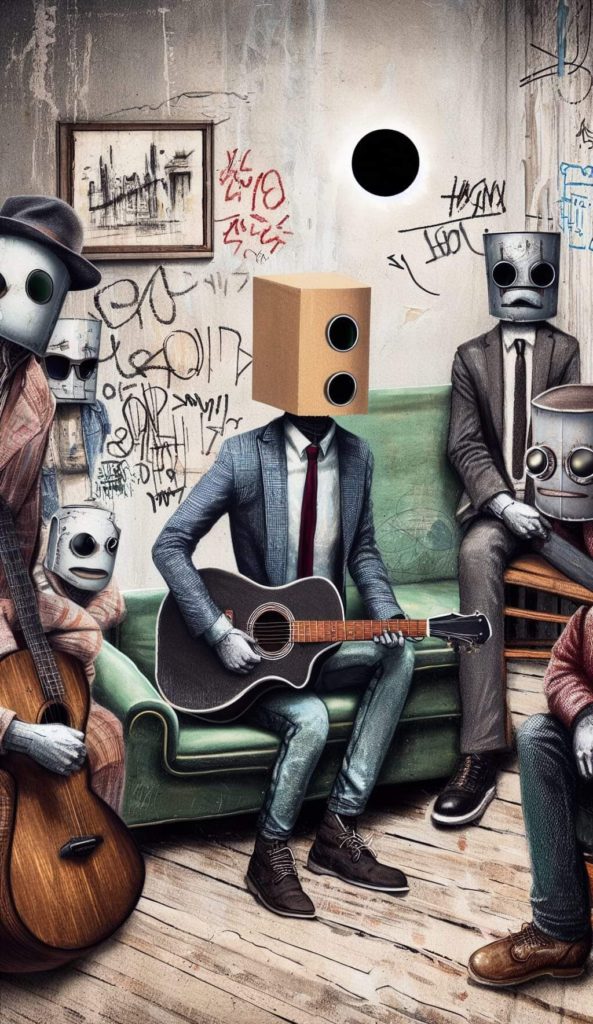Armed with a brand new globally collaborative album, songwriter and artist Matthew Pylypiv kindly took part in an interview. We talk about the new project Unfinished Business, exploring different styles, inspiration, live performance, and plenty more. Here’s how it went.
* * *
Hi Matthew – thanks for the interview, and my congratulations for the release of Unfinished Business this month. For those new to your work, how would you define your approach to making music?
Thank you! It’s been quite an exhilarating and fulfilling experience while also being quite a nervous, naked thing at times, too.
I’m in love with the creative process. It’s really quite magical, isn’t it? To have something that doesn’t exist come into existence and then produce feelings in people is simply uncanny—really the most special thing we humans have. It’s really enjoyable to tap into that feeling: to take whatever bits of inspiration I’ve had over time—pieces of guitar playing, a feeling or thought that keeps coming to mind, whatever—letting it all stew, discarding some pieces, combining others, and noticing unplanned themes emerge.
And with projects like this, I absolutely adored working with others—giving these amazingly talented people a structure, thoughts, feelings, but then letting them tap into whatever they felt from what they heard and putting that energy into the mix. Overall, there was this really interesting balance between directing a vision into being and letting the song show itself and not get in its way.
The impact and isolation of global lock-downs inspired and perhaps enforced the creation of this album. Where did that journey begin, with which track, and with what kind of mindset?
COVID and isolation certainly played a huge role in this. However, a lot of the pieces and ideas came about before then; in some cases, years before.
The main thrust for me was the year 2016. There was a common meme in that year that David Bowie had held the threads of the universe together, and that when he died everything just turned dark and strange. Politics created tensions in my circles in ways I had never experienced before, some really frightening developments were taking place in the USA, major music icons seemed to die every other week, and all the sorts of things that people can dwell on when they only focus on the negative in the news, but it seemed to be more than that—that reality itself had turned strange. And I felt his strangeness grow in my own personal life, including a marriage that inexplicably got…weird.
And yet…there was also this huge sense of hope and adventure throughout the year, if that makes sense. I can’t stress that enough. There was an intense hope that maybe we’d come through all of this weirdness and drama into something brighter.
The Blind Prophet (So Strange) came directly out of this, with multiple references to Bowie in the song.
When lock-down came, that was—first—an opportunity for me. I was finally in a position to focus on a project of this size. So many brilliant musicians couldn’t go on tour or even, in many cases, see their band-mates, and so they took to online session work.
As horrible as lock-down was, it created opportunities. But, of course, as it went on and on…and on and on…and another wild election year proceeded, those same feelings of alienation and weirdness and fear and hope were reinforced.
The final track completed was Landfall, which came about originally as a sort of follow-up to the classic song Wooden Ships by CSN and Jefferson Airplane—what would happen when people who took to the seas after a nuclear war finally set foot on land again? Well, when it came time to write lyrics, lock-down was ending and I discovered that it wasn’t purely joyful—that there was something uncertain about setting foot back in places that used to be normal, that shared trauma doesn’t simply end when the thing that caused the trauma ends. Still, though, the joy and beauty were indeed there, and I hope the song reflects that.
What does the title Unfinished Business highlight in terms of what the project means to you?
This goes back to what I was saying about how the themes that kept popping up seemed to apply both to the world at large (or the USA) as well as to my own personal life. I hope that people interpret these songs in all sorts of different ways, because I don’t intend them to mean just one thing. And this is true for Unfinished Business. The project was a way for me to sort though some of my own “unfinished business,” or personal baggage, as well as speak to some of society’s baggage.

You describe yourself as a music nut, whilst working as a history professor – how do these two passions interconnect, and do you still become infatuated with new or current music releases and news, or is it limited to historical impact?
In a direct sense, I absolutely do get energy from learning about older music and getting the sense of another time and set of experiences for humans. But, as cliched as it sounds, in my historian doings I truly believe that it’s impossible to understand the present without getting that “4D” understanding that comes with understanding the past. It makes everything richer, more meaningful, and more powerful.
The same is true for music. There’s a LOT of new music that excites me, and though I don’t want people to simply try to recreate older sounds, I very much appreciate those artists who know their influences, are a bit of an “old soul,” but also innovate.
“This is one thing that always impressed me about Bowie, for example: he quite clearly embraced influences and yet pushed music consistently in new directions.”
What’s your primary instrument, and how did the fuller sound of this multi-layered rock project come to life – how important and how easy or difficult was finding the right collaborators and band-mates?
For the most part, I stick with acoustic guitar plus some synth programming (using Ableton) and sound art. Finding collaborators was one of the most wonderful, exciting things I’ve ever experienced. I primarily used Fiverr. I tried to go with “feel,” more than anything else, when choosing who to contact, and every single person I worked with was an absolute joy and a beautiful person.
What are the main themes you were exploring with this album, and which song would you say best represents those intentions?
I’m really hoping to let people ponder over this!
What do you consider to be one of the best songs ever written, and why?
The Sound of Silence by Simon & Garfunkel. Simon wrote this when he was 21! It is such a beautiful, powerful statement about society without being overwrought. It’s powerful in the context of its time, and it’s just as powerful now. The guitar, the voices—everything is just right.
Is live performance on the cards for you and the band, and if so – where can fans check you out in the coming months?
That would be a blast. Unfortunately, this project involves people from 13 different countries. However, look for more releases on social media over the next year!
The album is impressively eclectic, with some strong rock grooves and contrasting ambient ventures alike. How important is this versatility, and what are some of your favourite bands or artists from genres that might surprise your listeners?
It’s funny to hear it described as eclectic. Not because it’s not true, but because I’ve heard a few people say that now and it wasn’t any sort of goal of mine.
I prefer albums that explore different directions. I especially love bands that have multiple songwriters and lead singers: Crosby, Stills, and Nash; Pink Floyd; the Moody Blues; and Fleetwood Mac, for instance.
As for surprises: Opeth is fantastic and their shows are mesmerizing! Neko Case is easily Top Five for me. Nick Cave is like a religious experience. And then there’s soul—everyone from Smokey Robinson to Danielle Ponder.
What’s next for you?
I’m bits-and-piecing about 25 ideas, trying to get a sense of the personality for the next album, which I hope to start working on next year—with as many of the current collaborators as possible!
* * *
Download or stream Unfinished Business. Find Phillips Merchant Band on Facebook & Instagram.

